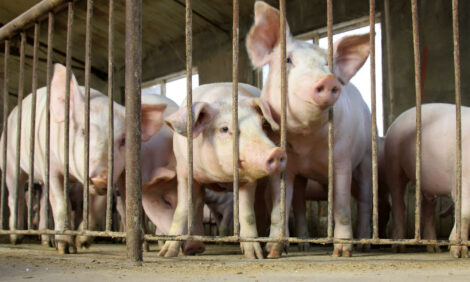



Platform Addresses Constraints in Uganda’s Pig Value Chains
UGANDA - The International Livestock Research Institute (ILRI) and the SNV Netherlands Development Organisation recently launched a first-ever pig value chain multi-stakeholder platform (MSP) in Uganda.Started in August 2014, the multi-stakeholder platform is one of the strategies that will be used by the Smallholder Pig Value Chain Development (SPVCD) project to improve the effectiveness of pig value chains in Uganda.
The pig value chain multi-stakeholder platform is an innovation platforms (IP) that will provide a mechanism to enhance communication and innovation capacity among Uganda pig sector actors by improving their interactions and coordination. It will also facilitate learning and contribute to production and use of knowledge. In this case, the MSP is geared at harnessing the collective actions of pig sector actors to address major constraints in the pig sector in the country.
The formation of the platform follows a successful pig value chain impact pathway workshop held in June 2013, which identified the roles of different pig sector actors and proposed setting up of multi actor networks to foster actor interaction across the private and public sectors.
Following the workshop, ILRI constituted a multi-institutional task force to map out a process for initiating multi-stakeholder platforms in the country and in the region. The task force, which comprised representatives from ILRI, Kampala Capital City Authority, SNV Netherlands, Volunteer Efforts for Development Concerns, Uganda Pig Organisation, Agro Empowerment Centre and the district veterinary officers of Kamuli, Mukono and Masaka districts, identified pig producers, farm input suppliers, feed suppliers, pig traders, pork butchers, roasters and processors as well as extension service providers, research, training and policy institutions and development institutions (NGOs, international and financial organizations) as key players in the Uganda pig sector.
SNV Netherlands will facilitate the pig value chain platform in addressing pressing constraints on the pig sector, developing and strengthening business linkages between actors in the pig sector and enhancing the visibility of the pig industry in the country.
A first meeting of the new platform was held on 19 August 2014 in Kamuli District in eastern Uganda and was attended by 46 stakeholders including farmers, input suppliers, extension service providers, pork roasters and pig traders. Participants at the meeting prioritized constraints in the pig value chain. Pig feeds and feeding, diseases and lack of water for their animals were identified as the highest priority constraints.
To address these challenges in the short-term, participants said they would adopt improved feeding practices that are already in place in their respective sub counties. They also scheduled learning visits to farms of model farmers to encourage peer-learning and knowledge-sharing activities.
Similar regional stakeholder meetings were held in Mukono (21 August 2014) and Masaka (26 August 2014) districts attracting the participation of 60 pig value chain actors in Masaka and 40 in Mukono. Among the key constraints to which the participants in both districts collectively agreed to find solutions to were access to quality feeds, reliable markets, decline in pig genetic quality and disease burden.
The first set of meetings aimed to identify priority constraints and develop intervening action plans. Progress in implementing these will be evaluated in the second set of meetings in November 2014.
A national multi-stakeholder platform meeting in Kampala on 2 September 2014 reviewed the constraints prioritized at the regional level meetings described above and appointed a nine-member interim committee, headed by Emma Naluyima– a former director of the Uganda Investment Authority, will coordinate activities towards achieving the platforms’ resolutions which includes the creation of a harmonized pig feed policy under the Ministry of Agriculture, Animal Industry & Fisheries, advocating for certifying and regulating the production and marketing of pig feeds, and eventually the exemption of value added tax on pig feeds and their ingredients.
It is anticipated that bringing together different actors of the pig value chain for sharing experiences, knowledge, skills, ideas and resources will contribute to economic gains through improved productivity and services in the pig value chain for the benefit of all actors.







